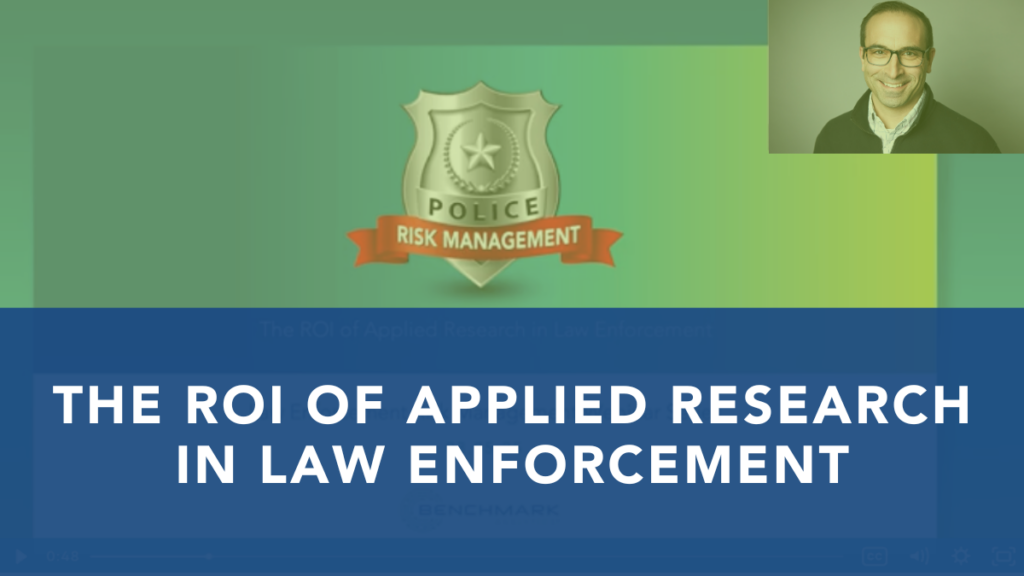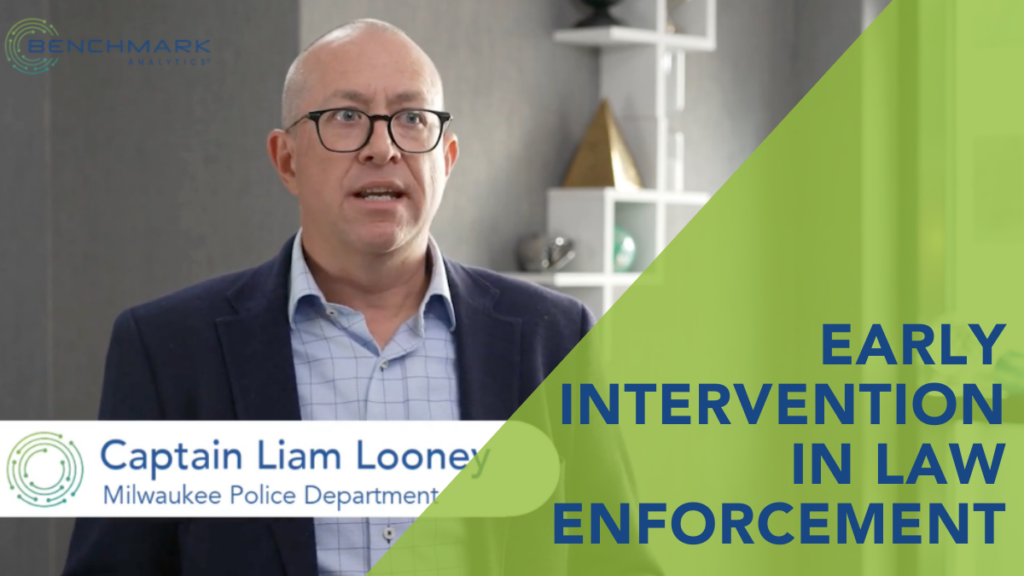From Early Intervention to Police Officer Wellness: The Evolution of First Sign® Precision Wellness
Posted
April 11, 2025
Share:
Police officers face extraordinary challenges in their daily work that most people can scarcely imagine. From routine calls to traumatic events, each day brings situations that can leave lasting psychological impacts. Over time, the accumulated stress of repeatedly witnessing trauma, working irregular shifts that disrupt natural sleep patterns, and facing the constant tension of potential danger takes a toll. This toll is reflected in research as well: law enforcement officers face a 54% higher risk of dying by suicide compared to the general population.
This crisis in police officer wellness calls for innovative, research-driven solutions that address the unique mental health challenges faced by those who protect and serve. Proactive support and early intervention are critical in helping to identify and assist officers before these stressors escalate into serious psychological distress or harmful coping mechanisms.
Our Journey: From Early Intervention to Wellness Innovation
At Benchmark Analytics, our focus on officer wellness developed from our roots in early intervention systems. This evolution happened through close collaboration with police departments across the country.
The story began with First Sign Early Intervention, a system we developed in partnership with the University of Chicago. This platform utilizes advanced analytics to identify officers at risk of problematic behavior before serious incidents occur. The system’s power comes from a research-driven foundation, utilizing over 70 million records to create sophisticated predictive models.
As we’ve implemented this system in departments nationwide, a recurring concern from Chiefs, wellness leaders, and command staff has emerged: “We’re losing good officers to burnout, trauma, and suicide. How can we better support our people?”
This recurring question leads to an important realization: the same data infrastructure and analytical techniques that help predict misconduct can also identify officers experiencing psychological distress or burnout. Certain behavior patterns predict misconduct, while others might indicate an officer struggling with trauma or fatigue.
Benchmark began exploring this possibility, collaborating with mental health researchers, clinical professionals, and law enforcement experts. Through this work, we identified two critical factors that substantially increase officers’ risk for mental health challenges:
- Exposure to significant events – Both acute incidents (like officer-involved shootings) and the cumulative effect of repeated exposure to traumatic situations
- Fatigue and exhaustion – The physical toll of irregular shifts, excessive overtime, and chronic sleep deprivation
With this foundation, the team set out to develop a solution that does more than identify officers in crisis—it provides a comprehensive wellness infrastructure to support them.
This approach aligns with the U.S. Department of Justice’s (DOJ) recommendations in its “Report on Best Practices to Advance Officer Wellness,” emphasizing the importance of early intervention for officer mental health. The DOJ has recognized that proactive, data-driven approaches to identifying officers needing support represent a critical advancement in law enforcement wellness programs.
The Architecture of Precision: How Our Police Officer Wellness System Works
First Sign Precision Wellness operates on three foundational pillars, each addressing a critical component of police officer wellness:
Identifying Those in Need: The Power of Proactive Analytics
Most wellness approaches rely on officers voluntarily seeking help—a significant barrier given the pervasive stigma around mental health in law enforcement culture. Early intervention for officer wellness fundamentally differs by using data that departments already collect to proactively identify officers who may need support.
How does this work in practice? The system analyzes data from multiple sources—computer-aided dispatch (CAD), records management systems (RMS), time logs, and more—to identify patterns that research has linked to increased mental health risks.
For example, the system tracks exposure to potentially traumatic incidents, from responding to deaths to encountering severe injuries. It assigns research-based severity ratings to different types of calls, allowing for the calculation of each officer’s cumulative exposure score. The system even recognizes anniversaries of critical incidents—days that might seem ordinary to others but represent traumatic memories for individual officers.
Similarly, it analyzes time logs to identify fatigue risk factors such as excessive overtime, inconsistent schedules, or patterns that suggest sleep disruption. When these indicators appear together—high trauma exposure combined with fatigue—research shows a significantly elevated risk for mental health issues.
Building the Plan: Structured Support When It Matters Most
challenging conversation for which most feel unprepared. Precision Wellness provides supervisors with comprehensive tools to have these difficult conversations effectively.
These include:
- Guided check-in templates that structure wellness conversations
- Video tutorials on approaching sensitive topics with officers
- Direct access to trauma-informed clinicians who can join conversations or provide guidance
- Case management tools to ensure follow-through on wellness plans
This approach is particularly effective because it removes the stigma of seeking help. Rather than requiring officers to raise their hands and admit vulnerability—something police culture often discourages—the system enables supervisors to initiate conversations based on objective data. As one wellness bureau commander explains, “It’s easier for an officer to accept help when I can say ‘the system flagged this pattern’ rather than ‘I’m worried about you.’”
This stigma-reduction approach addresses a key concern highlighted in the DOJ’s Officer Wellness report, which identifies eliminating mental health stigma as a critical strategy for improving officer wellness programs. The DOJ’s collaboration with the Department of Health and Human Services emphasizes providing supervisors with tools and resources to effectively support officers in need—precisely what First Sign Precision Wellness delivers.
Supporting Resilience: Evidence-Based Interventions That Work
The final pillar delivers research-proven content designed specifically for law enforcement. Through a partnership with researchers, Benchmark integrates interventions validated through randomized control trials in actual police departments.
These interventions demonstrate remarkable results, including:
- An average of 18 additional minutes of sleep per night
- A 50% reduction in self-reported PTSD symptoms
- A 33% reduction in anxiety symptoms
- A 45% reduction in episodes of falling asleep while driving
The Benchmark Wellness Academy™ delivers this content in accessible, bite-sized modules that fit into officers’ busy schedules. Topics range from sleep hygiene and fatigue management to emotional regulation and trauma processing techniques.
Notably, the entire system is supported by 24/7 access to culturally competent clinicians who understand the unique challenges of policing. These professionals can provide immediate crisis support, scheduled counseling sessions, and guidance for supervisors managing complex situations.
Real-World Impact: Transforming Police Officer Wellness Support
To understand how this system transforms police officer wellness, consider these examples:
Case 1: Preventing a Crisis Before It Happens In a mid-sized department, the system identifies an officer approaching the anniversary of an officer-involved shooting. Though the officer hasn’t mentioned it to anyone, the system recognizes the date and alerts the supervisor. Using the guided check-in framework, the sergeant has a conversation that reveals the officer is struggling but hasn’t felt comfortable asking for help. This intervention connects the officer with support resources before symptoms escalate to crisis level—a perfect example of how early intervention for officer wellness can prevent more serious issues from developing.
Case 2: Addressing Systemic Fatigue In a larger agency, the fatigue analysis identifies a concerning pattern that supervisors may be unable to track without data: approximately 1% of officers regularly work four 65-hour weeks in a row. Data shows these officers have significantly higher rates of citizen complaints, use of force incidents, and sick leave usage. Armed with this information, command staff implements new scheduling policies and targeted police officer wellness interventions, resulting in improved performance metrics and officer satisfaction scores.
Case 3: Changing Department Culture One agency uses First Sign Precision Wellness to implement annual wellness check-ins for all officers. By normalizing these conversations and removing the stigma of asking for help, they create a culture where officers become comfortable discussing mental health. Over 18 months, they see a 26% reduction in sick leave usage and a significant improvement in retention rates.
Beyond Technology: The Human Element of Police Officer Wellness
While the technology provides powerful tools for identifying and supporting officers in need, true police officer wellness requires more than algorithms and data points. It requires a fundamental shift in how agencies approach officer mental health.
First Sign Precision Wellness facilitates this shift by:
- Normalizing mental health conversations – By making police officer wellness check-ins routine rather than exceptional, the system helps reduce stigma around seeking help.
- Empowering supervisors – Front-line supervisors are often the first to notice when officers struggle but may lack the tools to help effectively. The system provides them with structured resources and expert support.
- Creating accountability – The case management component ensures that wellness plans are created and followed through, with regular check-ins and progress tracking.
- Building organizational awareness – Department-wide analytics help command staff understand broader police officer wellness trends, allowing them to address systemic issues like excessive overtime or insufficient recovery time between critical incidents.
This aligns with best practices identified by the National Council for Mental Wellbeing, which highlights early intervention systems as a key strategy for supporting officer wellness and preventing substance use disorders. According to their research, “Comprehensive behavioral health programs” and “early intervention systems” that can “identify changes in performance or wellbeing before substance use becomes entrenched” are crucial components of effective police officer wellness frameworks.
The Transformative Potential of Data-Driven Officer Wellness
The crisis in police wellness demands innovative solutions that go beyond superficial approaches or check-the-box programs. By applying the same data-driven rigor to police officer wellness that Benchmark applies to early intervention, First Sign Precision Wellness helps agencies build healthier, more resilient departments.
This matters not just for individual officers and their families but for the communities they serve. Officers struggling with untreated trauma or severe fatigue are less effective, more prone to errors in judgment, and more likely to leave the profession prematurely. Conversely, officers who receive appropriate support demonstrate greater resilience, better decision-making, and longer careers.
First Sign Precision Wellness delivers evidence-driven identification, reducing stigma through systematic approaches and providing comprehensive support resources. By implementing these evidence-based police officer wellness strategies, agencies can ensure that mental health support is as essential as physical safety for law enforcement officers.
This article was created with the assistance of AI technology to help convey our commitment to improving police officer wellness through data-driven solutions.
Related Posts
Ready to Experience the Benchmark Difference?
Benchmark Analytics and its powerful suite of solutions can help you turn your agency’s challenges into opportunities. Get in touch with our expert team today.



